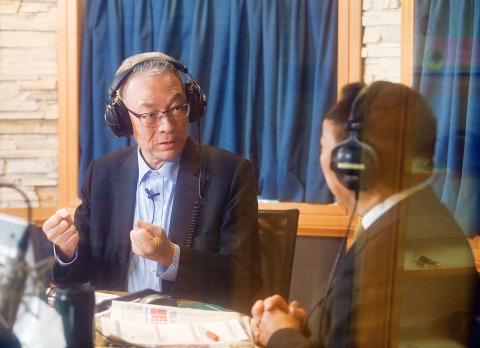Chinese Nationalist Party (KMT) Chairman Wu Den-yih (吳敦義) yesterday said that the KMT could sign a peace treaty with China if it returns to the Presidential Office after next year’s general elections.
Wu made the comments in an interview on morning radio show UFO Breakfast hosted by Tang Hsiang-lung (唐湘龍).
Earlier in the interview, Wu told Tang that the National Unification Guidelines, the implementation of which was suspended by former president Chen Shui-bian (陳水扁), could be reactivated by the KMT.

Photo: CNA
Tang then asked: “If the KMT is again the ruling party after next year’s elections, would and should it usher in a kind of final cross-strait peace treaty?”
“[Former minister of culture] Lung Ying-tai (龍應台) recently wrote that we have waited seven decades for an end to the war,” Tang said. “In a sense, the Chinese Civil War has not ended, because there has been no final peace treaty. Do you think that there should be such a peace treaty?”
Wu said that, according to the Act Governing Relations Between the People of the Taiwan Area and the Mainland Area (臺灣地區與大陸地區人民關係條例), only the government or its authorized institutions can negotiate agreements with China.
“If the KMT has the opportunity to rule again, then we would have met the conditions stipulated by the law,” Wu said.
“Assuming talks between the two sides are successful, a KMT government would be within its rights to sign a cross-strait peace treaty,” he said.
Asked if the party needs to change its cross-strait policy, Wu replied in the negative, saying that the KMT would not shift its position on the so-called “1992 consensus,” which he credited for “years of peace and stability” across the Taiwan Strait.
The “1992 consensus” — a term former Mainland Affairs Council chairman Su Chi (蘇起) in 2006 admitted making up in 2000 — refers to a tacit understanding between the KMT and the Chinese Communist Party that both sides acknowledge there is “one China,” with each side having its own interpretation of what “China” means.
Wu repeatedly refused to answer whether he plans to run for president next year, saying only that he has “a decision to make,” for which he did “not feel certain at present.”
Party unity, the chances of winning and fundraising are issues that he must consider before entertaining thoughts of a run for the presidency, he said.
The public would know his answer when registration for the KMT primary closes in May, Wu said, adding that he might decide not to run.
Separately yesterday, Democratic Progressive Party (DPP) spokesman Johnny Lin (林琮盛) said that “Wu’s so-called cross-strait peace treaty cannot guarantee peace; Taiwan’s sovereignty is the only foundation for building peace and stability.”
“The DPP stands fast in the defense of the sovereign independence of the Republic of China, Taiwan and the values of freedom, democracy and human rights,” he said.
Additional reporting by Su Fun-her

Intelligence agents have recorded 510,000 instances of “controversial information” being spread online by the Chinese Communist Party (CCP) so far this year, the National Security Bureau (NSB) said in a report yesterday, as it warned of artificial intelligence (AI) being employed to generate destabilizing misinformation. The bureau submitted a written report to the Legislative Yuan in preparation for National Security Bureau Director-General Tsai Ming-yen’s (蔡明彥) appearance before the Foreign Affairs and National Defense Committee today. The CCP has been using cognitive warfare to divide Taiwanese society by commenting on controversial issues such as Taiwan Semiconductor Manufacturing Co’s (TSMC, 台積電) investments in the

INVESTIGATION: The case is the latest instance of a DPP figure being implicated in an espionage network accused of allegedly leaking information to Chinese intelligence Democratic Progressive Party (DPP) member Ho Jen-chieh (何仁傑) was detained and held incommunicado yesterday on suspicion of spying for China during his tenure as assistant to then-minister of foreign affairs Joseph Wu (吳釗燮). The Taipei District Prosecutors’ Office said Ho was implicated during its investigation into alleged spying activities by former Presidential Office consultant Wu Shang-yu (吳尚雨). Prosecutors said there is reason to believe Ho breached the National Security Act (國家安全法) by leaking classified Ministry of Foreign Affairs information to Chinese intelligence. Following interrogation, prosecutors petitioned the Taipei District Court to detain Ho, citing concerns over potential collusion or tampering of evidence. The

‘COMPREHENSIVE PLAN’: Lin Chia-lung said that the government was ready to talk about a variety of issues, including investment in and purchases from the US The National Stabilization Fund (NSF) yesterday announced that it would step in to staunch stock market losses for the ninth time in the nation’s history. An NSF board meeting, originally scheduled for Monday next week, was moved to yesterday after stocks plummeted in the wake of US President Donald Trump’s announcement of 32 percent tariffs on Taiwan on Wednesday last week. Board members voted to support the stock market with the NT$500 billion (US$15.15 billion) fund, with injections of funds to begin as soon as today. The NSF in 2000 injected NT$120 billion to stabilize stocks, the most ever. The lowest amount it

NEGOTIATIONS: Taiwan has good relations with Washington and the outlook for the negotiations looks promising, Minister of Economic Affairs J.W. Kuo said Taiwan’s GDP growth this year is expected to decrease by 0.43 to 1.61 percentage points due to the effects of US tariffs, National Development Council (NDC) Minister Paul Liu (劉鏡清) said at a meeting of the legislature’s Economics Committee in Taipei yesterday, citing a preliminary estimate by a private research institution. Taiwan’s economy would be significantly affected by the 32 percent “reciprocal” tariffs slapped by the US, which took effect yesterday, Liu said, adding that GDP growth could fall below 3 percent and potentially even dip below 2 percent to 1.53 percent this year. The council has commissioned another institution